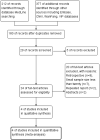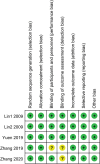Effectiveness of Montessori-based activities on agitation among Asian patients with dementia: A systematic review and meta-analysis
- PMID: 35960043
- PMCID: PMC9371576
- DOI: 10.1097/MD.0000000000029847
Effectiveness of Montessori-based activities on agitation among Asian patients with dementia: A systematic review and meta-analysis
Abstract
Objectives: Montessori based activity are supposed to be an effective nonpharmacological intervention in the treatment of agitation in western countries. However, most studies conducted to evaluate the effectiveness of Montessori based activities on agitation in Asian patients were small sample size, as well as inconsistent outcomes, which may limit the reliability of the conclusions. The present pooled analysis, hence, was conducted to evaluate the effectiveness of the activity on agitation related with dementia in Asian patients with dementia.
Design: Prospective randomized clinical studies were included, of which available data was extracted. Outcomes of physical aggressive behaviors, physical nonaggressive behaviors, and verbal aggressive behaviors were pooled for the analysis by weighted mean differences.
Data sources: Medline, Embase, Cochrane Library, China National Knowledge Infrastructure (CNKI), WanFang, and China Science and Technology Journal Database (VIP).
Eligibility criteria: Prospective, randomized, controlled clinical studies, conducted to evaluate the effectiveness of the activity on agitation related with dementia in Asian patients with dementia.
Data extraction and synthesis: Available data including baseline characteristics and interested outcomes from the included literature were extracted independently by 2 investigators. Measuring scales including CMAI and NOSIE were adopted for the efficacy comparison between Montessori based activity and standard activity. Weighted mean difference was used for the pooled analysis.
Results: A total of 460 participants were included in the present meta-analysis. The pooled mean difference agitation for Montessori based activity was -3.86 (95% CI: -7.38 to -0.34, P = 0.03) comparing to standard activity. The pooled mean differences for physical aggressive behaviors, physical nonaggressive behaviors, and verbal aggressive behaviors in Montessori based activity group were -0.82 (95% CI: -1.10 to -0.55; P < 0.00001), -0.81 (95% CI: -1.68 to 0.55; P = 0.07), and 0.38 (95% CI: -0.92 to 1.68; P = 0.57).
Conclusions: Montessori based activities may reduce the frequency of agitation, especially in physical aggressive behaviors comparing to standard activities in Asian patients with dementia. However, the effectiveness of Montessori based activities on reduction of subcategorized agitated behaviors including physical nonaggressive behaviors, and verbal aggressive behaviors may not be reliable as physical aggressive behaviors.
Copyright © 2022 the Author(s). Published by Wolters Kluwer Health, Inc.
Conflict of interest statement
The authors have no conflicts of interest to disclose.
Figures








Similar articles
-
Using acupressure and Montessori-based activities to decrease agitation for residents with dementia: a cross-over trial.J Am Geriatr Soc. 2009 Jun;57(6):1022-9. doi: 10.1111/j.1532-5415.2009.02271.x. J Am Geriatr Soc. 2009. PMID: 19507295 Clinical Trial.
-
Effectiveness of DementiAbility Methods: The Montessori Way on agitation in long-term care home residents with dementia in Hong Kong.Int J Geriatr Psychiatry. 2019 Sep;34(9):1352-1358. doi: 10.1002/gps.5063. Epub 2019 Mar 1. Int J Geriatr Psychiatry. 2019. PMID: 30697810
-
A randomized crossover trial to study the effect of personalized, one-to-one interaction using Montessori-based activities on agitation, affect, and engagement in nursing home residents with Dementia.Int Psychogeriatr. 2013 Apr;25(4):565-75. doi: 10.1017/S1041610212002128. Epub 2012 Dec 14. Int Psychogeriatr. 2013. PMID: 23237211 Clinical Trial.
-
Comparative Efficacy of Interventions for Aggressive and Agitated Behaviors in Dementia: A Systematic Review and Network Meta-analysis.Ann Intern Med. 2019 Nov 5;171(9):633-642. doi: 10.7326/M19-0993. Epub 2019 Oct 15. Ann Intern Med. 2019. PMID: 31610547
-
Effectiveness of horticultural therapy in people with dementia: A quantitative systematic review.J Clin Nurs. 2022 Jul;31(13-14):1983-1997. doi: 10.1111/jocn.15204. Epub 2020 Feb 20. J Clin Nurs. 2022. PMID: 32017241
Cited by
-
[Therapy strategies for repetitive vocalizations in dementia : A systematic review].Neuropsychiatr. 2024 Oct 15. doi: 10.1007/s40211-024-00511-5. Online ahead of print. Neuropsychiatr. 2024. PMID: 39406989 Review. German.
References
-
- Fetherstonhaugh D, Haesler E, Bauer M. Promoting mealtime function in people with dementia: a systematic review of studies undertaken in residential aged care. Int J Nurs Stud. 2019;96:99–118. - PubMed
-
- Cahill S. WHO’s global action plan on the public health response to dementia: some challenges and opportunities. Aging Ment Health. 2020;24:197–9. - PubMed
-
- Ballard CG, Margallo-Lana M, Fossey J, et al. . A 1-year follow-up study of behavioral and psychological symptoms in dementia among people in care environments. J Clin Psychiatry. 2001;62:631–6. - PubMed
-
- Wilks SE, Boyd PA, Bates SM, et al. . Montessori-based activities among persons with late-stage dementia: evaluation of mental and behavioral health outcomes. Dementia (London). 2019;18:1373–92. - PubMed
Publication types
MeSH terms
LinkOut - more resources
Full Text Sources
Medical

